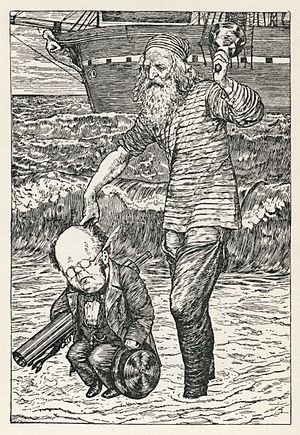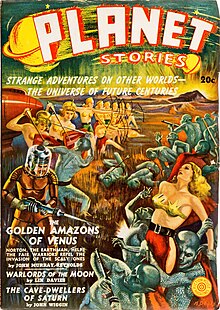Portal:Speculative fiction

Speculative fiction is an umbrella phrase encompassing the more fantastical fiction genres, specifically science fiction, fantasy, horror, supernatural fiction, superhero fiction, utopian and dystopian fiction, apocalyptic and post-apocalyptic fiction, and alternate history in literature as well as related static, motion, and virtual arts. It has been around since humans began to speak. The earliest forms of speculative fiction were likely mythological tales told around the campfire. Speculative fiction deals with the "What if?" scenarios imagined by dreamers and thinkers worldwide. Journeys to other worlds through the vast reaches of distant space; magical quests to free worlds enslaved by terrible beings; malevolent supernatural powers seeking to increase their spheres of influence across multiple dimensions and times; all of these fall into the realm of speculative fiction. Speculative fiction as a category ranges from ancient works to cutting edge, paradigm-changing, and neotraditional works of the 21st century. It can be recognized in works whose authors' intentions or the social contexts of the versions of stories they portrayed is now known. For example, Ancient Greek dramatists such as Euripides, whose play Medea (play) seemed to have offended Athenian audiences when he fictionally speculated that shamaness Medea killed her own children instead of their being killed by other Corinthians after her departure. The play Hippolytus, narratively introduced by Aphrodite, is suspected to have displeased contemporary audiences of the day because it portrayed Phaedra as too lusty. In historiography, what is now called speculative fiction has previously been termed "historical invention", "historical fiction," and other similar names. It is extensively noted in the literary criticism of the works of William Shakespeare when he co-locates Athenian Duke Theseus and Amazonian Queen Hippolyta, English fairy Puck, and Roman god Cupid all together in the fairyland of its Merovingian Germanic sovereign Oberon in A Midsummer Night's Dream. In mythography it has been termed "mythopoesis" or mythopoeia, "fictional speculation", the creative design and generation of lore, regarding such works as J. R. R. Tolkien's The Lord of the Rings. Such supernatural, alternate history, and sexuality themes continue in works produced within the modern speculative fiction genre. Jump to a specific section belowSelected profileRodney Stephen Steiger (/ˈstaɪɡər/ STY-gər; April 14, 1925 – July 9, 2002) was an American actor, noted for his portrayal of offbeat, often volatile and crazed characters. Ranked as "one of Hollywood's most charismatic and dynamic stars", he is closely associated with the art of method acting, embodying the characters he played, which at times led to clashes with directors and co-stars. He starred as Marlon Brando's mobster brother Charley in On the Waterfront (1954), the title character Sol Nazerman in The Pawnbroker (1964) which won him the Silver Bear for Best Actor, and as police chief Bill Gillespie opposite Sidney Poitier in the film In the Heat of the Night (1967) which won him the Academy Award for Best Actor. Steiger was born in Westhampton, New York, the son of a vaudevillian. He had a difficult childhood, running away from home to escape an alcoholic mother at the age of 16. After serving in the South Pacific during World War II, he began his acting career with television roles in 1947, and went on to garner critical acclaim for his portrayal of the main character in the teleplay "Marty" (1953). He made his stage debut in 1946, in a production of Curse you, Jack Dalton! at the Civic Repertory Theatre of Newark, and subsequently appeared in productions such as An Enemy of the People (1950), Clifford Odets's Night Music (1951), Seagulls Over Sorrento (1952), and Rashomon (1959). (Full article...)Selected workLego Star Wars II: The Original Trilogy is a 2006 Lego-themed action-adventure game developed by Traveller's Tales and published by LucasArts and TT Games Publishing. It was released on 11 September 2006. Part of the Lego Star Wars series, it is based on the Star Wars science fiction media franchise and Lego Group's Lego Star Wars construction toy line. It follows the events of the Star Wars films A New Hope, The Empire Strikes Back and Return of the Jedi. The game allows players to assume the roles of over 50 Lego versions of characters from the film series; customized characters can also be created. Camera movement was improved from its predecessor Lego Star Wars: The Video Game and the concept of "vehicle levels" was explored more thoroughly. The game was revealed at American International Toy Fair. Promotions for the game were set up at chain stores across the United States.
Lego Star Wars II was critically and commercially successful; it has sold over 8.2 million copies worldwide as of May 2009. Critics praised the game for its comedic and "adorable" portrayal of the film series and due to preference for the original trilogy over the prequel trilogy. However, the game's low difficulty, and its Game Boy Advance and Nintendo DS versions in general, were received more poorly. The game received awards from the British Academy of Film and Television Arts and Spike TV, among others. A mobile phone adaptation, Lego Star Wars II Mobile, was later developed by Universomo, published by THQ, and released on 5 January 2007. Lego Star Wars II and its predecessor were compiled in Lego Star Wars: The Complete Saga, released much later that year. (Full article...) Selected quote
Selected picture Plate I of Henry Holiday's original illustrations for the first edition of Lewis Carroll's The Hunting of the Snark, a nonsense poem written in 1874 that tells the story of ten individuals who cross the ocean to hunt the Snark. In common with other Carroll works, the meaning of the poem has been queried and analysed in depth. It is divided into eight "fits" (a pun on the archaic fitt meaning a part of a song, and fit meaning a convulsion) and is by far Carroll's longest poem. (POTD) Did you know...
Upcoming conventionsJune:
July:
Dates can usually be found on the article page. See also these convention lists: anime, comic book, furry, gaming, multigenre, and science fiction. Selected article The planet Venus has been used as a setting in fiction since before the 19th century. Its opaque cloud cover gave science fiction writers free rein to speculate on conditions at its surface—a "cosmic Rorschach test", in the words of science fiction author Stephen L. Gillett. The planet was often depicted as warmer than Earth but still habitable by humans. Depictions of Venus as a lush, verdant paradise, an oceanic planet, or fetid swampland, often inhabited by dinosaur-like beasts or other monsters, became common in early pulp science fiction, particularly between the 1930s and 1950s. Some other stories portrayed it as a desert, or invented more exotic settings. The absence of a common vision resulted in Venus not developing a coherent fictional mythology, in contrast to the image of Mars in fiction. When included, the native sentient inhabitants, Venusians, were often portrayed as gentle, ethereal and beautiful. The planet's associations with the Roman goddess Venus and femininity in general is reflected in many works' portrayals of Venusians. Depictions of Venusian societies have varied both in level of development and type of governance. In addition to humans visiting Venus, several stories feature Venusians coming to Earth—most often to enlighten humanity, but occasionally for warlike purposes. (Full article...)On this day...Book releases
Births
Deaths
Possible futuresPossible events in the future as suggested by science fiction:
Things you can do...Here are ideas for how you can help improve the coverage of speculative fiction topics on Wikipedia: Join a WikiProject or task force:
Start a requested article:
Expand a stub: Expand a new article:
Note: If no articles are shown below, please work on those found in the Archive. This list was generated from these rules. Questions and feedback are always welcome! The search is being run daily with the most recent ~14 days of results. Note: Some articles may not be relevant to this project. Rules | Match log | Results page (for watching) | Last updated: 2024-06-07 22:52 (UTC) Note: The list display can now be customized by each user. See List display personalization for details.
Recognized contentFeatured articles are considered to be the best on Wikipedia, as determined by Wikipedia's editors, and Good articles are those which are considered to be of good quality but which are not yet featured article quality. If you see one that should be listed here, please add it or post on the talk page and let us know so we can add it for you. Speculative fiction topicsCreators: Artists (list) · Authors (by nationality) · Editors Fantasy
Creators: Artists · Authors Horror
Creators: Artists · Authors SubcategoriesRelated portalsWikimediaThe following Wikimedia Foundation sister projects provide more on this subject:
Associated content
Science fiction The following Wikimedia Foundation sister projects provide more on this subject:
Fantasy The following Wikimedia Foundation sister projects provide more on this subject:
Horror The following Wikimedia Foundation sister projects provide more on this subject:
Portal directory |


























